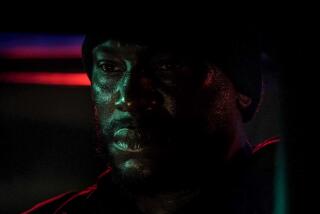Movie Reviews : ‘Dead-Bang’: Desperate-Cop Quest Is Off-Target Thriller
- Share via
In John Frankenheimer’s “Dead-Bang” (citywide), Don Johnson, playing a scruffy Los Angeles cop hot on the trail of a fascist underground group, has a squeezed-up, desperate look. He keeps grabbing onto things--bottles, people, his own clothes--like a bleary golden boy after an all-night binge. Johnson and Frankenheimer cannily play up the character’s near-alcoholism, his hair-trigger temper, vulnerability to insult and his shame-faced little-boy shuffle when he gets in a jam.
Johnson’s Jerry Beck gives the movie some internal tension, which it really needs. Supposedly “Dead-Bang” is based on fact--Beck is a real-life L.A. cop--but it’s been hammered into the usual one-man vendetta saga. The movie’s Beck, his glasses falling apart, his taxes overdue, his sanity in question, has become, superficially, Columbo crossed with James Dean. Johnson makes him a sweating never-say-die bulldog racing through the metallic jags and cold corners of the plot: a sleek, formula “message” thriller with no exits.
Arrayed against him are bureaucrats, smirking fascists, an obnoxious ex-wife, uncooperative local police and hidebound FBI agents (William Forsythe, playing a reactionary robot after his radical robot in “Patty Hearst”). There’s also the apparent killer himself (Frank Military) popping up regularly with three maniac buddies and an endless supply of attack rifles.
The story is a weird unjelled mixture of fact and fancy, fiction and formula. The best scenes have a real smack of truth: the frenzied street chase that begins with the kidnapping of a testy parole officer (Bob Balaban) and ends with an exhausted Beck up-chucking on his tackled suspect. The worst of them rattle around in an exploding gutter of gratuitous, bloody kitsch.
In the ‘60s, Frankenheimer was a master of the topical political thriller; then, his style seemed a curious blend of Orson Welles tracks and angles, film-noir urban cynicism and the electronic shorthand of TV journalism. When he’s working at top pressure, he still knows how to tighten the vise. Some of “Dead-Bang” is gratifyingly fast, sharp and mean, full of acrobatic camera movements, offbeat, crammed frames and salty, sarcastic confrontations. But where his ‘60s movies, like “Manchurian Candidate,” were verbally adroit and audacious, “Dead-Bang” clots its social observations with hack repetition and the usual paranoid lone-wolf ‘80s affectations. (Beck bullies almost everyone, including his psychiatrist.)
Like his contemporaries Arthur Penn in “Target” or Sidney Lumet in “The Morning After,” Frankenheimer is wasting his time with material like this. What can he do besides showcase Johnson, get in a few little grace notes on alcoholic torment and keep the ball, and the camera, moving? “Dead-Bang” (rated R) not only falls short compared to Frankenheimer’s best ‘60s work, but from his best ‘80s work, too--like the Elmore Leonard-scripted “52 Pickup,” with its startling sadism and perversity, its cruel humor and its great psycho-villain by John Glover. By comparison, “Dead-Bang,” ends not with a bang, but a simper.
More to Read
Only good movies
Get the Indie Focus newsletter, Mark Olsen's weekly guide to the world of cinema.
You may occasionally receive promotional content from the Los Angeles Times.










